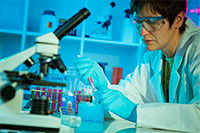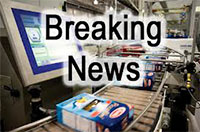FSMA and Food Testing
Lawrence D. Goodridge, PhD
As the intricacies of the U.S. Food Safety and Modernization Act (FSMA) continue to be smoothed out, one aspect of the proposed Act that is receiving a fair amount of attention is FSMA and food testing requirements — who does the testing and whether accreditation is required by the testing laboratories. Although most of the details still need to be finalized, a close reading of FSMA reveals that the terms “laboratories” and “accreditation” are linked a total of 24 times.1 As well, s. 202 of FSMA requires the establishment of a program for food testing by accredited laboratories and stipulates that the FDA must establish a program for laboratory accreditation to ensure that U.S. food-testing laboratories meet acceptable standards.2

The new FSMA’s new rules and regulations have important implications for food testing laboratories.
The recently formed Food Laboratory Alliance, a collaboration between a number of major food testing laboratories, promotes food safety and food lab testing quality, and education of its members on food lab regulatory and legislative issues, and is as an advocate for more testing to ensure a safe food supply. Clearly, one of the Alliance’s main priorities will be to convince the food testing laboratory community of the need for accreditation.
Current Accreditation Stats
It is estimated that less than 5% of the food testing laboratories in the United States are currently accredited.3 In North America, accreditations are earned through one of eight laboratory accrediting bodies, such as the American Association for Laboratory Accreditation (A2LA) and the ANSI-ASQ National Accreditation Board, which accredit labs according to standards set by the International Laboratory Accreditation Cooperation (ILAC). ILAC recognizes accreditation bodies around the world through multilateral recognition arrangements (MRA), which provide a single, globally accepted testing standard. MRA eliminates the need for exporters and/or importers to retest products when they arrive in their destination country.4
It remains to be seen, however, what kind of accreditation FSMA will require for food testing laboratories. As well, FSMA may make distinctions between in-house labs (those set up by a company for the testing its own foods), and commercial food testing laboratories. A recent survey by Food Manufacturing revealed that 32.5% of food processors use both in-house and outside food testing laboratories, 28.9% use only in-house food testing and 24.1% use outside labs exclusively. The remaining 14.5% indicated that they don’t require food testing.5
On the question of whether or not in-house laboratories would require or be eligible for laboratory accreditation under FSMA, The Food and Drug Administration has stated that while it supports laboratories’ interests in pursuing accreditation, it is not yet ready to enforce accreditation under FSMA.6
FSMA and Pathogens
Current legislation also does not address which pathogens (including bacteria, viruses and parasites) labs must test for, and how environmental sampling will be incorporated into the food testing requirements. Finally, there will likely need to be a way to add emerging pathogens to any required pathogen-testing list.
It’s clear that many questions about FSMA and food testing remain, and will need to be answered if effective and standardized food testing is to become a reality under the Act.
Notes
- Food and Drug Administration, 2011. FDA Food Safety Modernization Act. http://www.gpo.gov/fdsys/pkg/PLAW-111publ353/pdf/PLAW-111publ353.pdf
- Ibid
- Andrews, J. Food Testing: Accreditation a Growing Trend Among Food Labs. Food Safety News, October 14, 2013
- Ibid
- Flynn, D. Food Labs Integral to Changing World of Food Safety. Food Safety News, October 7, 2013.http://www.foodsafetynews.com/2013/10/food-labs-integral-to-changing-world-of-food-safety/#.Ut1WSpUo6M8
- Food and Drug Administration, 2013. Food Safety Modernization Act. Frequently Asked Questions.http://www.fda.gov/Food/GuidanceRegulation/FSMA/ucm247559.htm
About the Author
Lawrence D. Goodridge, PhD, is the Ian and Jayne Munro Chair in Food Safety at the Department of Food Science and Agricultural Chemistry, McGill University Montreal, Quebec.
To have more articles like this emailed to your inbox, become a GFSR Member today!

-
 FeaturedRisk management
The Cost of a Breach: What a Cyberattack Could Mean for Food Safety Recalls
FeaturedRisk management
The Cost of a Breach: What a Cyberattack Could Mean for Food Safety Recalls
-
 FeaturedRisk management
Securing the Food Chain: How ISO/IEC 27001 Strengthens Cybersecurity
FeaturedRisk management
Securing the Food Chain: How ISO/IEC 27001 Strengthens Cybersecurity
-
 FeaturedRisk management
Revolutionizing Food Safety Training: Breaking Out of the “Check-the-Box” Mentality
FeaturedRisk management
Revolutionizing Food Safety Training: Breaking Out of the “Check-the-Box” Mentality
-
 GFSI Standards
GFSI 2025: Building Trust, Tech-Forward Solutions, and Global Unity in Food Safety
GFSI Standards
GFSI 2025: Building Trust, Tech-Forward Solutions, and Global Unity in Food Safety
-
 FeaturedFood Safety
Integrated Pest Management: Strategies to Protect Your Brand’s Reputation
FeaturedFood Safety
Integrated Pest Management: Strategies to Protect Your Brand’s Reputation
-
 FeaturedFood Safety Culture & Training
No Open Door Policy: Challenges That Impact Pest Control in Food Processing Plants
FeaturedFood Safety Culture & Training
No Open Door Policy: Challenges That Impact Pest Control in Food Processing Plants


